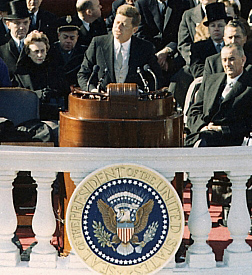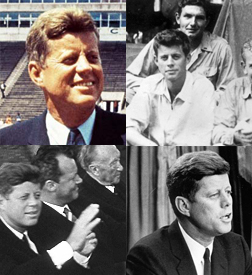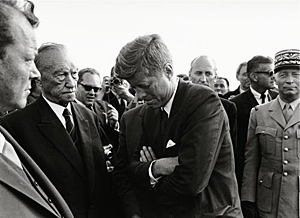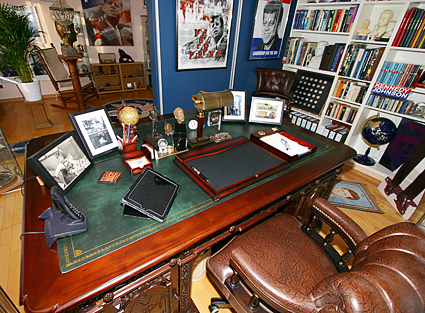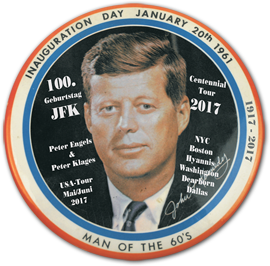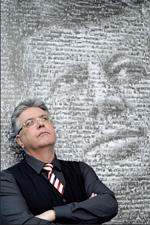
JFK life
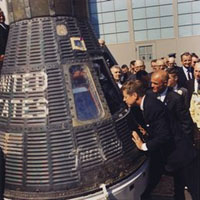
1962, JFK inspecting
the Mercury capsule
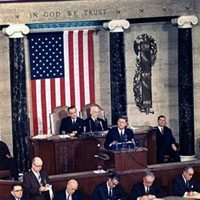
1963, State of the Union speech
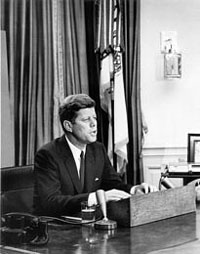
1963, Civil Rights speech
|
Presidency
John F. Kennedy was sworn in as the 35th President at noon on January 20, 1961.
In his inaugural address he spoke of the need for all Americans to be active citizens, famously saying, "Ask not what your country can do for you; ask what you can do for your country." He asked the nations of the world to join together to fight what he called the "common enemies of man: tyranny, poverty, disease, and war itself". He added: "All this will not be finished in the first one hundred days. Nor will it be finished in the first one thousand days, nor in the life of this Administration, nor even perhaps in our lifetime on this planet. But let us begin." In closing, he expanded on his desire for greater internationalism: "Finally, whether you are citizens of America or citizens of the world, ask of us here the same high standards of strength and sacrifice which we ask of you." We choose to go to the Moon in this decade and do the other things, not because they are easy, but because they are hard; because that goal will serve to organize and measure the best of our energies and skills; because that challenge is one that we are willing to accept, one we are unwilling to postpone, and one which we intend to win ... It is for these reasons that I regard the decision last year to shift our efforts in space from low to high gear as among the most important decisions that will be made during my incumbency in the office of the Presidency. - JFK, 1962 The address reflected Kennedy's confidence that his administration would chart an historically significant course in both domestic policy and foreign affairs. The contrast between this optimistic vision and the pressures of managing daily political realities at home and abroad would be one of the main tensions running through the early years of his administration. Kennedy brought to the White House a stark contrast in organization compared to the decision-making structure of former general Eisenhower; and he wasted no time in dismantling Eisenhower's methods. Kennedy preferred the organizational structure of a wheel, with all the spokes leading to the president. He was ready and willing to make the increased number of quick decisions required in such an environment. He selected a mixture of experienced and inexperienced people to serve in his cabinet. "We can learn our jobs together", he stated. Much to the chagrin of his economic advisors who wanted him to reduce taxes, Kennedy quickly agreed to a balanced budget pledge. This was needed in exchange for votes to expand the membership of the House Rules Committee in order to give the Democrats a majority in setting the legislative agenda. The president focused on immediate and specific issues facing the administration, and quickly voiced his impatience with pondering of deeper meanings. Deputy national security advisor Walt Whitman Rostow once began a diatribe about the growth of communism, and Kennedy abruptly cut him off, asking, "What do you want me to do about that today?" Kennedy approved Defense secretary Robert McNamara's controversial decision to award the contract for the F-111 TFX (Tactical Fighter Experimental) fighter-bomber to General Dynamics (the choice of the civilian Defense department) over Boeing (the choice of the military). At the request of Senator Henry Jackson, Senator John McClellan held 46 days of mostly closed door hearings before the Permanent Subcommittee on Investigations investigating the TFX contract from February–November 1963. next: Domestic policy |
|
Article based on John F. Kennedy from Wikipedia, the free Encyclopedia.
Text available under the Creative Commons Attribution-ShareAlike License Wikipedia® is a registered trademark of the Wikimedia Foundation, Inc., a non-profit organization. |

